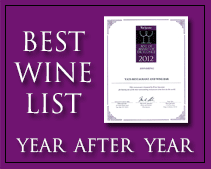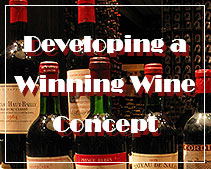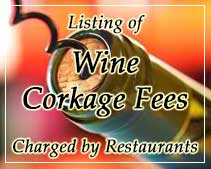Climate Change: How to Save Wine from Extreme Weather
By JEFFREY T. IVERSON
If there were any climate-change doubters in the wine industry, it seems they are now as rare as a 1921 ChÂteau d’Yquem. As the third annual World Conference on Climate Change and Wine gets underway April 13-14 in Marbella, Spain, the debate seems to be settled, and a new evolution in mentalities is taking place. “I think the majority of the wine industry has acknowledged that there is a problem called climate change – the impacts are being observed in wine regions throughout the whole world,” says Pancho Campo, Spain’s first master of wine and the conference’s organizer. “Now, the next step is we have to motivate them to start taking action.”
Which is why scientists and wine-industry heavyweights are gathering in Spain to debate and showcase new strategies for adapting to and mitigating climate change. The worldwide climatic events of 2010-11 alone explain why climate is ever present on these winemakers’ minds, according to Greg Jones, a climatologist and viticulture expert at Southern Oregon University. While 2010 was the warmest year on record for the northern hemisphere, says Jones, more worrisome is the increasing climate variability – record cold winters followed by record hot summers, droughts and fire seasons giving way to extreme rainfall and flooding. Says he: “That variability in climate produces a lot of variability in production and grape quality, therefore it really strongly influences economic risk in wine regions worldwide.”
Concerns over how recent extreme weather has affected grape quality, especially the balance between maturity in sugar content and aroma, helped spur behemoth Spanish wine producer Bodegas Torres into action. Hoping to become part of the solution, the company is leading, along with the Spanish government, a multimillion-euro nationwide research project studying the mechanisms of wine’s adaptation to climate change. The firm is also testing new rootstocks that show increased resistance to drought or delay ripening to allow the aroma more time to mature, and its growers have recovered more than 20 forgotten Catalonian grape varietals that they believe will fare better in high temperatures than common varieties imported from northern Europe. “This is where part of the success lies in the future,” says Mireia Torres, daughter of CEO Miguel Torres and general manager of two of the firm’s wineries.
For Chilean wine producer Concha y Toro, too, the motto is “Adapt or die.” Convinced that temperatures in Chile’s central grape-growing valley will continue rising over time, Latin America’s largest wine producer participated in a thermographic study of the region that allowed it to identify new growing regions along river basins that act as corridors of air from the Pacific Ocean or the Andes mountains. At the end of 2009, Concha y Toro released their Gran Reserva Serie Riberas line of wines, which promise to have a freshness uncommon to Chilean cuvÉes.
But while Campo is supportive of efforts to adapt to climate change, he believes these measures only postpone the problem by a decade or two. “The solution is not just in changes like new varietals or replanting vineyards,” he says. “The solution is mitigation – it’s more important to reduce CO2 emissions and energy waste and increase recycling at the winery level.”
Indeed, many wine companies are trying to reduce their carbon footprint these days – and want the consumer to know it. In the past few years, wineries like California’s Fetzer, Bodegas Torres and Concha y Toro have put less glass in their bottles to reduce the weight – and shipping-fuel costs. Winegrowers of the Pepieux cooperative in France’s Languedoc region have abandoned glass entirely in favor of having their Greener Planet Wine, made from sustainably grown grapes, bottled in plastic PET bottles. The firm says the move has cut the carbon cost of transportation by more than 60%. Meanwhile, at the winery level, Bodegas Torres already uses photovoltaic and solar panels to generate some 10% of its energy and 50% of its hot water, and in 2011 will participate in the inauguration of a wind farm, which should generate 60% of the winery’s energy needs.
But Inge Kotze, coordinator of the WWF’s Biodiversity and Wine Initiative in South Africa, worries that some wineries are overfocusing on carbon reduction, and she thinks the best way for winegrowers to mitigate climate variability is through holistic management of the natural systems on their estates, which can “climate-proof” a region against fire and floods. She cites recent dramatic cases in South Africa of natural systems springing back into balance after the simple act of removing invasive plant species like pine trees or blue gum, which can suck a watershed dry. “Streams which farm workers who have lived [in these areas] for 60 years have never seen before now flow,” says Kotze.
This should be a reminder that because “much of the climate-change debate has been so focused on expensive technological interventions, average people feel it’s beyond their reach to be able to make a difference,” adds Kotze. “If every producer took an active role in managing their vineyard’s natural systems, we could dramatically reduce our impact on the earth.”
Wine master Campo agrees: “Our goal is to make people understand that the solutions have to start with us. And that’s where we haven’t succeeded yet.” Perhaps, though, one gathering of wine lovers in Spain will be the start.
http://news.yahoo.com/s/time/20110413/hl_time/08599206497100
Although the Philippines is not known for being the wine capital of Asia, Clark Pampanga is the most frequently visited destination for wine lovers in Cebu, Angeles City and Manila to shop for some good vintage wine. The famous wine shop outside Manila called Clark Wine Center is the largest wine shop in Philippines which offers over 2000 selections of fine vintage wine from all wine regions, vintages spanning over 50 years covering all price ranges.
This wine shop in Clark is highly recommended as one of the best places to buy wine in Pampanga. Clark Freeport is just outside Manila near Subic and Angeles City Philippines is Clark Wine Center. Visitors buy wine in Manila and Pampanga should not miss stopping at this wine shop for a few bottles of fine vintage wines to bring home.
Established in 2002, YATS WINE CELLARS is a wholly-owned business unit of Hong Kong-based Yats International which owns and operates resort, wine shops, wine bars and fine-dining restaurant properties in Clark Freeport in The Philippines. YATS WINE CELLARS caters to a clientele of discerning wine lovers from all over the world. Besides a good selection of wine for everyday enjoyment, YATS offers a unique selection of aged vintage wines made available to wine enthusiasts at remarkably affordable prices. Vintages span over a century and the selection of old- and new-world wines covers all major wine regions.
http://www.ClarkWineCenter.com
Getting to this wine shop in Pampanga Angeles City Clark Freeport Zone Philippines from Manila
Getting to the Clark Wine Center wine shop from Manila is quite simple: after entering Clark Freeport from Dau and Angeles City, proceed straight along the main highway M A Roxas. Clark Wine Center is the stand-along white building on the right, at the corner A Bonifacio Ave. From the Clark International Airport DMIA, ask the taxi to drive towards the entrance of Clark going to Angeles City. From Mimosa, just proceed towards the exit of Clark and this wine shop is on the opposite side of the main road M A Roxas.
Clark Wine Center
Bldg 6460 Clark Observatory Building
Manuel A. Roxas Highway corner A Bonifacio Ave,
Angeles Clark Freeport Zone, Pampanga 2023
0922-870-5173 0917-826-8790 (ask for Ana Fe)
YATS Wine Cellars
Manila Sales Office
3003C East Tower, Phil Stock Exchange Center,
Exchange Rd Ortigas Metro Manila, Philippines 1605
(632) 637-5019 0917-520-4393 ask for Rea or Chay
Best place to buy wine in Clark Pampanga outside Manila near Subic and Angeles City Philippines is Clark Wine Center.
Wedding couples looking for wedding reception venues and beach wedding venues can log on to this Philippines Wedding Venue web site for free information and assistance:
http://www.PhilippinesWeddingVenue.com
While in Clark, it might be a good idea to enjoy an evening of wine-and-dine in the fine dining Yats Restaurant and Wine Bar that features an award winning 2700-line wine list. It is located in Mimosa Leisure Estate of Clark Freeport Zone. For more information, visit http://www.YatsRestaurant.com
YATS Leisure Philippines is a developer and operator of clubs, resorts and high-class restaurants and wine shops in Clark Angeles Philippines http://www.YatsLeisure.com
Looking for famous tourists spots, places to visit and see, relax and unwind in Clark, Pampanga, Philippines? You may want to check out these sites also:
http://www.HotelClarkPhilippines.com
http://www.ClarkPhilippines.com
http://www.YatsWineCellars.com
You can skip to the end and leave a response. Pinging is currently not allowed.







